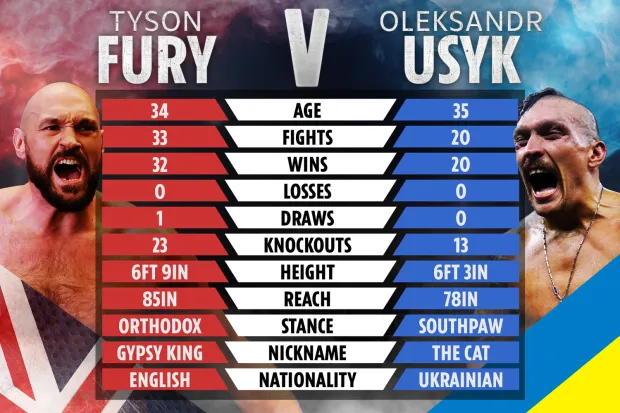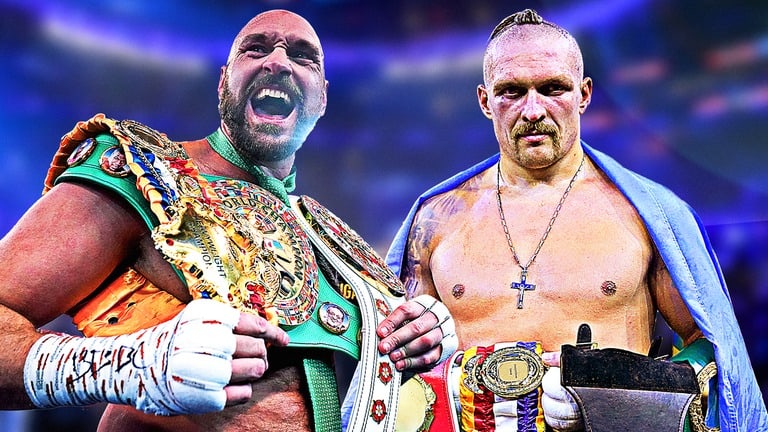Table of contents
The “undisputed” heavyweight championship fight between Tyson Fury and Oleksandr Usyk has taken a circuitous route, to say the least.
It’s been postponed not once, but twice, but it appears that we now have a date. So they’ll go at it on Saturday, May 18, and with the Saudi Arabian money that’s involved, it will take place at the Kingdom Arena in Riyadh.
The Fury Vs Usyk betting odds are tight on this one
It’s quite unusual for a heavyweight title fight to have different wagering options that have each man favored. The first place we looked showed us Usyk as a -120 favorite with Fury at -110. But we have also seen Fury as a small favorite. For more insights on effective strategies, explore the best ways to bet on a fight.
It would be apparent that the public is being influenced by Fury’s last appearance in the ring. There he was fighting former UFC champ Francis Ngannou, who was making his pro boxing debut. Fury got floored in the third round of that fight, and managed to escape with a split decision win. Learn more about the fundamentals of betting on fights with our detailed guide on how to bet on fighting.
That was an official bout that appears on the fighters’ respective line-by-line records, so maybe it was surprising that Fury wasn’t in the sharpest form. So one of the challenges for you when deciding if you’ve got value with Fury is determining whether he was taking that Ngannou fight seriously.
So what’s at stake here?
If you haven’t been paying very close attention to these kinds of things (or perhaps don’t care too much about the “alphabet soup”), you may not be aware that Usyk holds three of the four widely recognized championship belts. So he comes into this unification fight as the WBO, IBF and WBA titleholder, while Fury has the WBC crown.
If you’re looking to sharpen your betting skills further, check out our essential tips to become a professional sports bettor Tips to Become a Professional Sports Bettor.
Usyk, who won the heavyweight gold medal at the 2012 Olympics, has held the unified cruiserweight (200 pounds and under) title, and after defeating Tony Bellew in November 2018, he set his sights on the heavyweight division, where he’s won five consecutive fights, including two over former heavyweight champion Anthony Joshua.
Upon stopping Daniel Dubois in nine rounds back in August, he brought his record to 21-0 with 14 wins inside the distance. Fury is 34-0-1 with 24 KO’s, with the only blemish being a draw in his first bout against Deontay Wilder, where he had to heroically get off the deck after what looked like a game-ending knockdown. Fury subsequently stopped Wilder twice, but in the third meeting he was floored.
Oleksandr Usyk on the floor-to-ceiling ball ahead of his undisputed heavyweight clash with Tyson Fury next month 🥊
— IFL TV (@IFLTV) April 9, 2024
Do you think he'll be the first man to beat Fury? 🤔
Check out our full Fury vs Usyk YouTube playlist HERE 🔗 https://t.co/hqT0h82Ksr#FuryUsyk | #BoxingNews pic.twitter.com/CjK314Ksds
So what took so long?
Well, Fury had suffered some injuries in his fight against Ngannou, which took the Usyk fight out of a scheduled December 23 date and moved it to February 17.
Then Fury sustained a cut during training, which forced another postponement. The bout was pushed back to May 18, and reportedly most of the original undercard has remained intact.
A couple of years ago, Usyk had to take a hiatus for a different reason, as Russia’s invasion of his native Ukraine had him taking up arms. As he was quoted, “Country and honor are more important than a championship belt.”
What are the fighters getting paid?
Actually, that number is a fluid one, as each fighter may be participating in a “back end” that is based on pay-per-view sales.
It has been reported that there is a pool of $150 million that will be split between the fighters, with Fury getting roughly 70% of that as the bigger draw. Bob Arum of Top Rank, who has a promotional involvement with Fury (along with Frank Warren, of course), has indicated that his man should make at least $100 million, which is a staggering figure.
Allegedly one of the conditions set forth by Usyk is that Fury make a donation of $1 million to Ukraine out of his end of the purse.
What will the fighters weigh?
Well, obviously we’re not going to know this for certain until the weigh-in is conducted, but we have a pretty good idea what to expect from Usyk.
He’s shown a lot of discipline since declaring himself a heavyweight. In his last fight he came in at 221. Prior to that he was 221-½, 221-¼, 217-¼ and 215. So you’ll see him somewhere within this narrow range.
Fury’s weight is less predictable. Backtracking on his weights in recent years, he was 277-¾ against Ngannou, 268-¾ against Derek Chisora, 264-¾ vs. Dillian Whyte, 277 and 273 against Deontay Wilder. If you want to go back a little further, he weighed 254-½ for his fight against Otto Wallin, 263-½ for Tom Schwarz and 256-½ for the first fight with Wilder.
It’s probably safe to say that Usyk will surrender anywhere from 35 to 50 pounds. I’d guess maybe on the low side of that, because Fury was facing hefty opponents in his last three. Ngannou, Chisora and White came in at 272, 260-¾ and 253-¼, respectively. Against Usyk he doesn’t have a huge foe to worry about.

Fury makes a statement that is shared by many
At a press conference to promote this fight, Fury made his feelings very clear about the matchup.
While acknowledging that Usyk was a capable opponent, and that he respects him as a fighter and a man, he asserted that the weight difference between the two was indeed a barrier.
“When the cruiserweights step up to the big boys, usually they get found wanting,” he said. “You can beat the average big ones but you can’t beat the elite big ones, because size really matters.”
If you surveyed many of the people in the boxing industry, you’d find that the majority feel that same way, although they are wary of Fury, based on his effort against Ngannou.
Fury answered that last concern by saying he’s got his father in camp – a “secret weapon” as he put it – and this will help him get into optimum shape.
Can a heavyweight not be heavy enough?
Well, this is an interesting question to explore, and I used to have a lot of discussions with the late, famed boxing historian Hank Kaplan about the subject.
Certainly we had to agree that athletes continue to get better, stronger and quicker as time progresses. Accordingly, the bigger athletes are more, well, athletic than they used to be. Just take a look at the numbers that come out of the NFL Scouting Combine and you’ll get a pretty good idea about the evolution of the athlete in general.
There was a time when a fighter of Fury’s size (6-9, 260-280) would be oaf-like in the ring. But the landscape has obviously changed. If you’re any kind of student of boxing history, you know that for years and years, heavyweight champions of the world weighed less than 200 pounds. Three obvious examples who should be familiar to most boxing fans are Joe Louis, Rocky Marciano and Floyd Patterson, although there are quite a few more.
But guys are bigger now. That’s how we get people like Fury, Wilder, Lennox Lewis and the Klitschko brothers, behemoths who at the same time have the athleticism and dexterity to be formidable.
And so Hank suggested – and keep in mind that this conversation took place more than fifteen years ago – that the way these heavyweights were getting bigger and bigger, we were going to need another division between that and the cruiserweights.
And so now we have the “Bridgerweight” division from the WBC, designed for fighters between 200 and 224 pounds. The WBA has its own version of that called “Super Cruiserweight.” It’s designed to give the smaller heavyweights a chance, although there’s no money in it yet.
Usyk would fit right into a division like this. But as we said, there’s no real money to be had.
So we beg the question again, is he too small to do battle with someone who could possibly go in 50 pounds heavier?

Let’s do some historical perspective on smaller guys moving up
This is by no means a comprehensive study, but just an offering of some examples to illustrate.
It certainly is not too high a mountain to climb for fighters to give up a lot of weight in a heavyweight bout, and some achieved quite a bit in a lower division.
Mickey Walker was one of the greatest pound-for-pound fighters of all time, and the “Toy Bulldog” was utterly fearless. A natural middleweight, he moved up to fight two ex-heavyweight champions.
First he fought Jack Sharkey, and came away with a 15-round draw, despite giving up 29 pounds (169-½ to 198-½). Then he took on Max Schmeling and gave up 14 pounds, as he suffered an eighth-round TKO.
Famously, Billy Conn, one of the great light heavyweight champions, challenged for Joe Louis’ heavyweight title in June 1941. Louis weighed 199-½, but Conn was actually under the light heavyweight limit at 174. Despite this weight disadvantage, Conn, who was a master boxer, had confused Louis enough to take a lead on two of the three scorecards after twelve rounds. But he got a little greedy in the 13th, and the more powerful Louis stopped him. There was a rematch five years later, and Conn, who surrendered 25 pounds, was stopped in eight rounds.
Bob Foster, another of the great light heavyweight champs, had no success moving up to fight top-flight heavyweights. At 188 pounds, he gave up 21 pounds to Joe Frazier and lasted only two rounds. And against Muhammad Ali, he was at a huge weight disadvantage (221-¼ to 180), and despite cutting Ali, he was no match, going to the canvas seven times en route to an eighth-round knockout defeat.
Leon Spinks was more successful against Ali, of course. At 197-¼, he spotted 27 pounds to Ali and outhustled the aging warrior to win a 15-round decision and the heavyweight crown in February 1978. Ali did get his revenge seven months later in the rematch, with a 20-pound weight edge. Leon later fought in the cruiserweight division but did not win a title.
Leon’s brother Michael, a dominant light heavyweight titleholder, skipped the cruisers and went for the gusto against WBC heavyweight champ Larry Holmes in September 1985. With the help of a specialized program from strength and fitness guru Mackie Shilstone, the younger Spinks was able to bulk up to 199-¾ and still maintain explosiveness, and he was able to outpoint the 221-½-pound Holmes in what was considered a big upset. Holmes was more aggressive in the rematch seven months later, but still lost a hotly-disputed split decision.
Roy Jones Jr., who had started his career in the junior middleweight division, was a reigning light heavyweight belt-holder when he also skipped the cruiserweights and took on WBA heavyweight champion John Ruiz in March 2003. Jones bulked up to 193 pounds, still giving up 33 pounds to Ruiz (who was 226). Jones had too much quickness for the plodding Ruiz and won by scores of 116-112, 118-110 and 117-111 to win the title before moving back down in weight.
Some people might be surprised to know that against the 6-8 Wilder, Fury had weight advantages of 44, 42 and 39 pounds. And that was a factor, although it didn’t prevent Fury from being put down in two of those bouts.
In Usyk’s five heavyweight outings, he’s been outweighed by 27, 38-¼, 18-¾, 23 and 12-¼ pounds. So he’s become accustomed to having to devise strategies to adapt.
So what’s the bottom line?
It would be one thing if Usyk was the type of fighter who had to get into a slugfest with Fury; in that instance he wouldn’t be properly equipped.
So for his sake, it’s fortunate that his basic game plan is not to score knockouts, but to outsmart and outpoint his opponents.
That was his strategy in both fights against Anthony Joshua, and most likely in the last fight against Daniel Dubois as well, although he did register a ninth-round TKO.
If you looked at our examples of fighters who moved up in weight with some success, or even near-success, they had one thing in common (okay, with the possible exception of Leon Spinks). And that is, they took exceptional skills with them.
Usyk s not spectacularly athletic in the way that some of these guys may have been, but he has his fundamentals down pat and is extremely disciplined. And that would tend to minimize the number of mistakes he’ll make.
Sure, he’s got to avoid getting hit hard with consistency. But he can conceivably beat Fury to the punch and be the busier man.
He could win this fight, but my problem when looking at this as a betting proposition is that I just don’t know if I’m getting enough value with him. So I’d be interested to see how these numbers move.




